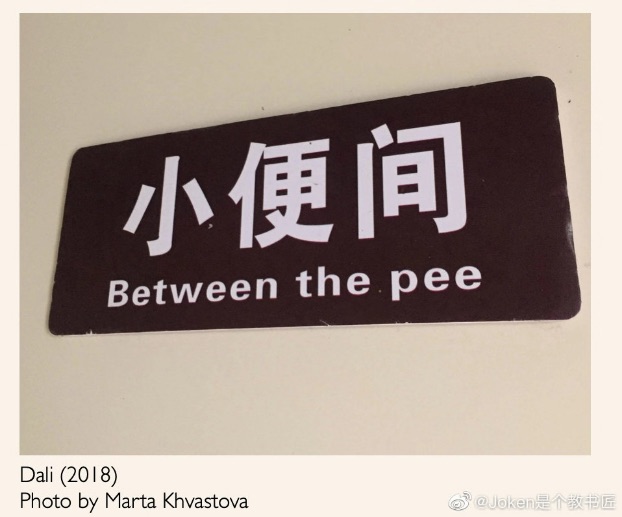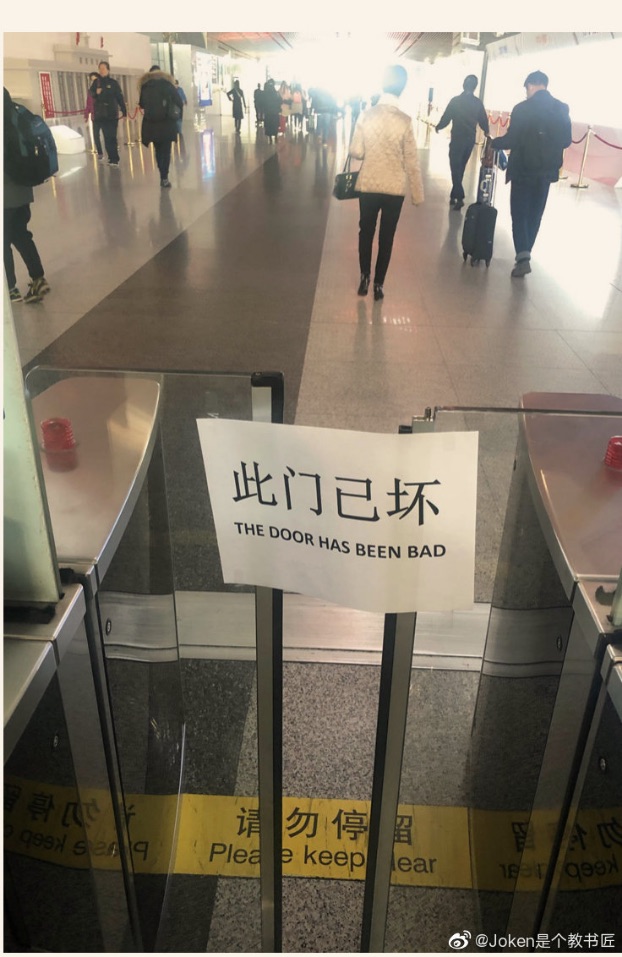Between pee and bad
« previous post | next post »
Two delightful Chinglish specimens submitted by Karen Yang:
The Chinese on the sign reads:
xiǎobiàn jiān
小便间
"urinal room; pissoir"
The key to understanding this mistranslation is that, while xiǎobiàn 小便 does indeed mean "pee; urine", jiān 间 does not mean "between" (one possible translation in other contexts), but "room; compartment; apartment". Most references to xiǎobiàn jiān 小便间 have to do with Paris or other French cities, so that's why I have translated it as "pissoir" here.
Here's the second one:
The Chinese on this sign reads:
cǐ mén yǐ huài
此门已坏
"this door is broken / bad / out of order"
The person who wrote this sign was trying to wax a bit literary and / or was trying to save space, so they used the classical demonstrative cǐ 此 for "this" and the classical adverb yǐ 已 to indicate that a condition is already in existence from some past time (hence, "has been").
It's always risky to rely on software or inadequate knowledge of literary usage to translate from Chinese that is not based on common, high frequency Mandarin to other languages.
Selected readings
- "Emoji in Chinese music video lyric" (6/19/19)
- "A quantum leap in the Chinese toilet revolution" (5/6/19)
- "Linguistic advice in the lavatory: speaking Mandarin is a great convenience for everyone" (9/11/07)
- "Just the Queen invites irrigation" (4/8/08)
- "Chinese lesson for today" (8/29/10)
- "Next day's Chinese lesson" (8/31/10)
- "It is forbidden to urinate here. The penalty is bang." (9/2/10)
- "Urination is inhuman " (2/6/11)
- "Pwimming poot" (8/29/11)
- "Don't pee on this teapot " (3/28/13)
- "Urine meat balls" (11/23/13)
- "Greater and lesser conveniences" (6/25/14)
- "Please pee in the pool" (8/4/14)
- "Please micturate in the urinal" (4/19/15)
- "Kein Durchgang" (5/16/15)
- "Qishan smell of urine yellow croaker" (5/22/15)
- "Six God toilet water itching" (11/25/15)
- "'Please enter your cock after urinating'" (4/9/16)
- "Sino-Sanskritic 'devil'" (12/11/18)
- "Toilet Revolution!!" (11/26/17) — see particularly the last comment for numerous articles on this subject in the Chinese press
- "Toilet: A Love Story" (9/1/18)
- "Toilet revolution!, part 2" (11/22/18)
- "Toilet revolution, an unfinished business: beware!" (5/25/19)
- "Civilized urinating" (10/31/17)
- "Let's go to the toilet for dinner tonight" (8/8/08)
- "Quadrilingual Washlet Instructions" (8/22/09)
- "I'm lovin' it — next to the toilet" (12/12/09)
- "Japanese hi-tech toilet instructions" (1/19/17)
- "Chinese lesson for today" (8/29/10)
- "Next day's Chinese lesson" (8/31/10)
- "Signs from Kashgar to Delhi" (10/11/13)
- "Mind your manners at the urinal, won't you?" )11/16/15)
- "Bovine / friggin' toilet" (9/6/18)
- "Opening and closing necrophilia" (7/22/18)


jin defang said,
August 15, 2019 @ 9:50 am
"pissoir" may not be so far-fetched. When my mother, as a young bride, went to meet her in-laws in Germany, she was sent into fits of laughter by a hotel sign reading "episserie." Perhaps dreamed up by someone who felt that Frenchifying the act sounded more elegant.
IMarvinTPA said,
August 15, 2019 @ 10:28 am
I would be inclined to write "No treat for it!" on the bad door sign.
bz said,
August 15, 2019 @ 12:18 pm
"pissoir" is used for "urinal" in Russian as well.
Twill said,
August 15, 2019 @ 7:22 pm
@jin defang
A light-hearted pun on "épicerie", I would've thought.